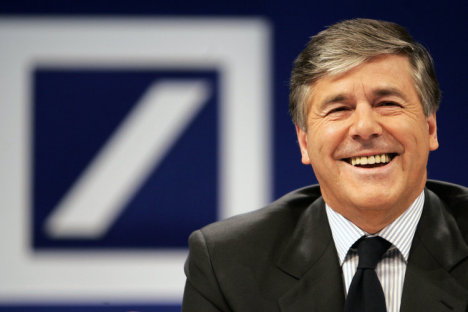
Bilderberg 2010 in Sitges: Josef Ackermann
– Deutsche Bank CEO Just Gave A Terrifying Speech In Frankfurt (Business Insider, Sep. 5, 2011):
Josef Ackermann just gave a terrifying speech about the fragility of the Euro banking sector right now.
At a conference in Frankfurt he said, “It is an open secret that numerous European banks would not survive having to revalue sovereign debt held on the banking book at market levels.”
We have translated the speech based on Handelsbatt’s, the organizer of the event where Ackermann spoke, account of it.
“In recent weeks, the distrust of the financial markets has spread to the banks because they are now suffering from the debt crisis in Europe and have a lot of exposure to, for example, Greek bonds.”
“Since the financial crisis, some European banks have lost a third or more of their market capitalization,” he said, according to Google Translate.
“Most institutions have a rating of “below the book value or at best.”
There are three major stress factors crushing Euro banks right now, he says: the debt crisis, structural factors and financial regulation. With them together, it will be hard for the European banks to increase their revenues.
The implication is that not just Eurozone countries are buckling under the pressure of Greece’s, France’s, and Italy’s debts, but banks are too. It sounds like a desperate call for a bailout. Now.
However he says, “State funds could use means to put stability back into many companies and countries, but that does not remain the only solution.”
Still, the situation he describes looks dire. He says, “Many countries and households would have to reduce their debt. The mortgage business and consumer loans were [the few things] driving growth. In addition, there’s the problem of shrinking populations in several European countries, which negatively affects the growth of credit markets.”
“All this reminds one of the autumn of 2008,” said Ackermann. “We should resign ourselves to the fact that the ‘new normality’ is characterized by volatility and uncertainty.”
Some hedge funds, like in 2007 and 2008, saw the enormity of the Eurozone debt crisis and began betting against Euro banks and other companies that have exposure to the crisis earlier this year. Their profits have already started to pay off.
As for the rest of the financial industry, things don’t look good.
Here’s what Ackermann sees: “Prospects for the financial sector overall… are rather limited.”
“We have a financial industry that is still not really providing convincing answers to the questions about the meaningfulness of many modern financial products and trading in securities. The questions are getting louder and require new responses.”
He also believes high frequency trading needs to be investigated more. He said regulators and the banks need to begin a dialogue to examine the effects of HFT in the markets, so as to avoid imbalances in the markets.
However a consequence of all of this scrutiny is that growth prospects for banks are low.
“The outlook for the future growth of revenues is limited by both the current situation and structurally.”
The banks will have to ask how they can be more long-term investors in order to gain more stability in financial markets.
“We must in my opinion, check all our work in all areas thoroughly again to ascertain whether we prioritize our genuine tasks as servants of the real economic needs.”
But immediately, the Euro banking sector must prepare for what happens if solutions to the Eurozone crisis and corresponding Euro banking crisis remain unsupported or nonexistent.
However recapitalization is not the answer. Ackermann duly shot down the measure suggested by IMF head Christine Lagarde at Jackson Hole.
He said recapitalizing the banks urgently, as Lagarde suggested, would be “counterproductive.”
“A forced recapitalization would give the signal that politicians do not themselves believe in the measures” they are negotiating.
As a result, it could exacerbate the debt situation in individual countries. Also, faced with a threat of dilution (a result of recapitalization), private investments in banks would be even less likely.
Another measure that he does not think will help, he says, is dissolving the Eurozone. “The costs of supporting weak member states, particularly from the German perspective, are less than the costs of disintegration…. It is a dangerous illusion to believe that a country could do better should it reclaim the sovereignty it has delegated to the EU.”
Sounds like Ackermann just sounded the alarm. There is now a full-on Euro banking crisis.
The conference he’s at continues tomorrow. It’s entitled “Banks in Transition,” and it’s organized by the German business daily Handelsblatt.
Here’s a couple of videos of him giving the speech. Warning: they are in German.

The priented money gets its value when it is handed over to the people against their services in service and production sectors.
If a country or region is printing money for the labour and production of some other country. After some time his own production sector shall collapse.
The value of money shall be lessor.
Things shall become expensive.
Unemployment shall be at rise.
social disparity shall take place .
crime rate shall be higher.
Banks whose role is just to disperse money for production and services purpose shall have no role to play in such environment.
Lately collapse shall occur.
Solution is debt free economy means no recession no loss of production, no unemployment, no crime, stable social structure and normal state , country and region.